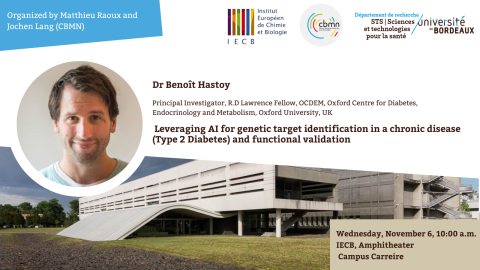Le mercredi 6 novembre prochain à 10h à l'IECB (amphithéâtre), le Dr Benoît Hastoy (Principal Investigator, R.D Lawrence Fellow, OCDEM, Oxford Centre for Diabetes, Endocrinology and Metabolism, Oxford University, UK) donnera une conférence intitulée : "Leveraging AI for genetic target identification in a chronic disease (Type 2 Diabetes) and functional validation"
Le Dr Benoît Hastoy est invité par Jochen Lang et Matthieu Raoux (CBMN) dans le cadre de la Mobilité entrante courte durée du Département Sciences & Technologies pour la Santé.
Abstract
Insulin, the body’s only hypoglycaemic hormone, is crucial for maintaining normal blood sugar levels and is secreted exclusively by pancreatic β-cells. Dysfunctions in these cells lead to impaired insulin secretion and diabetes. Genetics play a significant role in Type 2 Diabetes (T2D) risk, with about 700 genetic loci that could contribute to its onset. My work is dedicated to investigating the molecular mechanisms that regulate physiological insulin secretion and the dysfunctions caused by Type 2 Diabetes (T2D)-risk alleles [1-5]. At the Centre for Artificial Intelligence in Precision Medicine (CAIPM), we use AI to discover new genetic targets for T2D treatment, aiming to develop small molecules. Among the top 1,000 AI-identified potential targets, many are confirmed by previous Genome Wide Association Studies (GWAS), and novel ones were detected. We are now validating the roles of these targets in islet β-cells and testing in-house compounds to restore insulin secretion, laying the groundwork for further collaboration with our colleagues in Bordeaux.
Références
[1] Electrophysiological characterization of inducible pluripotent stem cell-derived human β-like cells and an SLC30A8 disease model, Diabetes 2024, 73, 1255,
[2] Loss of ZnT8 function protects against diabetes by enhanced insulin secretion, Nat Genet 2019, 51, 1596
[3] Type 2 diabetes risk alleles in PAM impact insulin release from human pancreatic β-cells, Nat Genet 2018, 50, 1122
[4] Electrophysiological properties of human beta-cell lines EndoC- βH1 and - βH2 conform with- human β-cells, Sci Rep 2018, 8, 16994
[5] A central small amino acid in the VAMP2 transmembrane domain regulates the fusion pore in exocytosis, Sci Rep 2017, 7, 2835
[2] Loss of ZnT8 function protects against diabetes by enhanced insulin secretion, Nat Genet 2019, 51, 1596
[3] Type 2 diabetes risk alleles in PAM impact insulin release from human pancreatic β-cells, Nat Genet 2018, 50, 1122
[4] Electrophysiological properties of human beta-cell lines EndoC- βH1 and - βH2 conform with- human β-cells, Sci Rep 2018, 8, 16994
[5] A central small amino acid in the VAMP2 transmembrane domain regulates the fusion pore in exocytosis, Sci Rep 2017, 7, 2835
Contact
- Matthieu Raoux - matthieu.raoux@u-bordeaux.fr
- Jochen Lang - jochen.lang@u-bordeaux.fr
Flyer Conférence
Dernière mise à jour :


